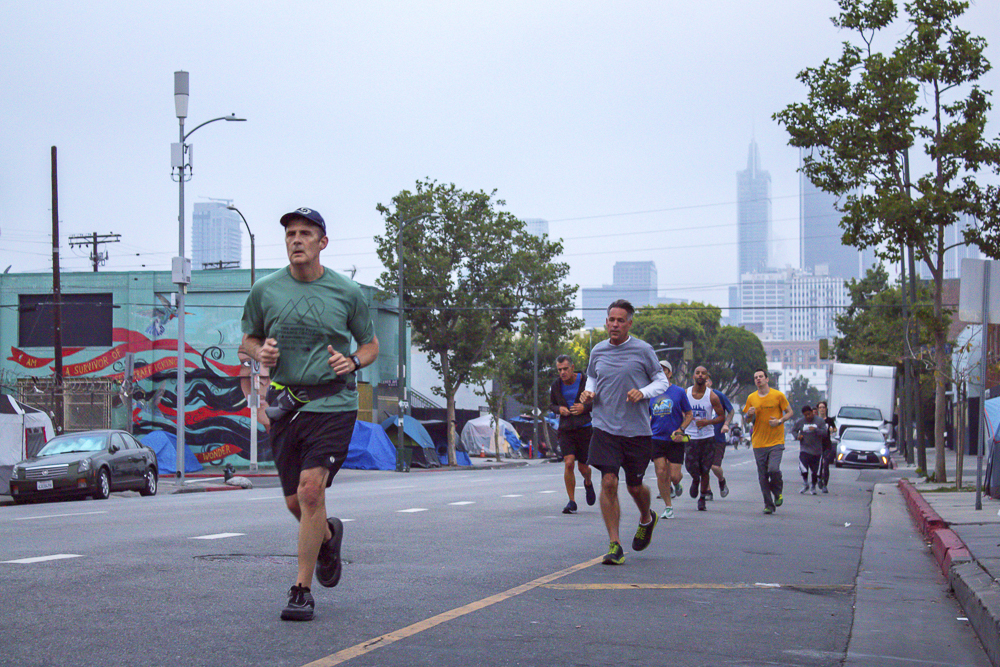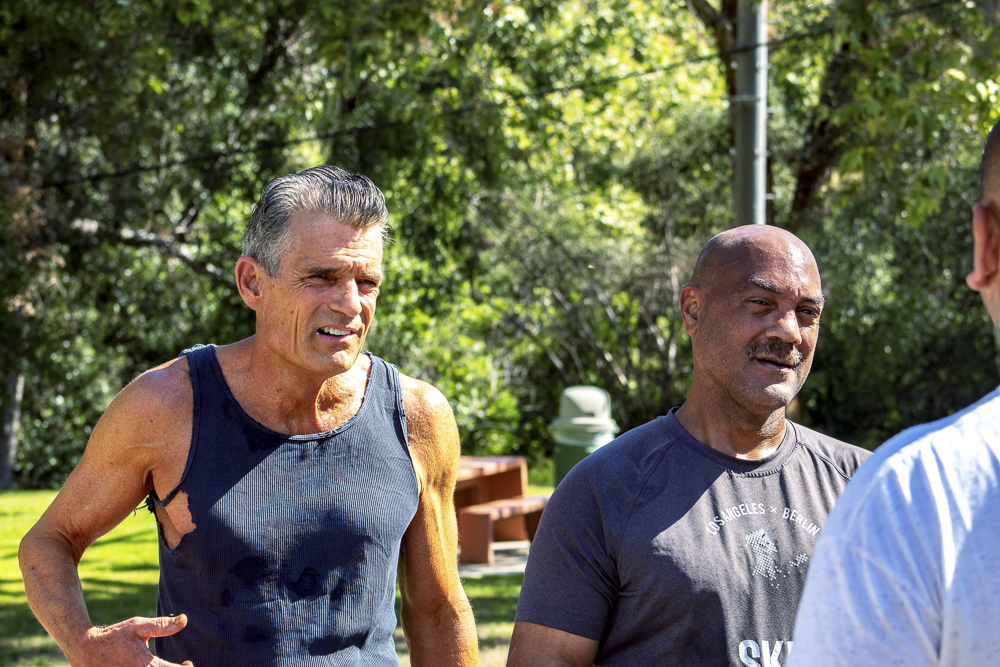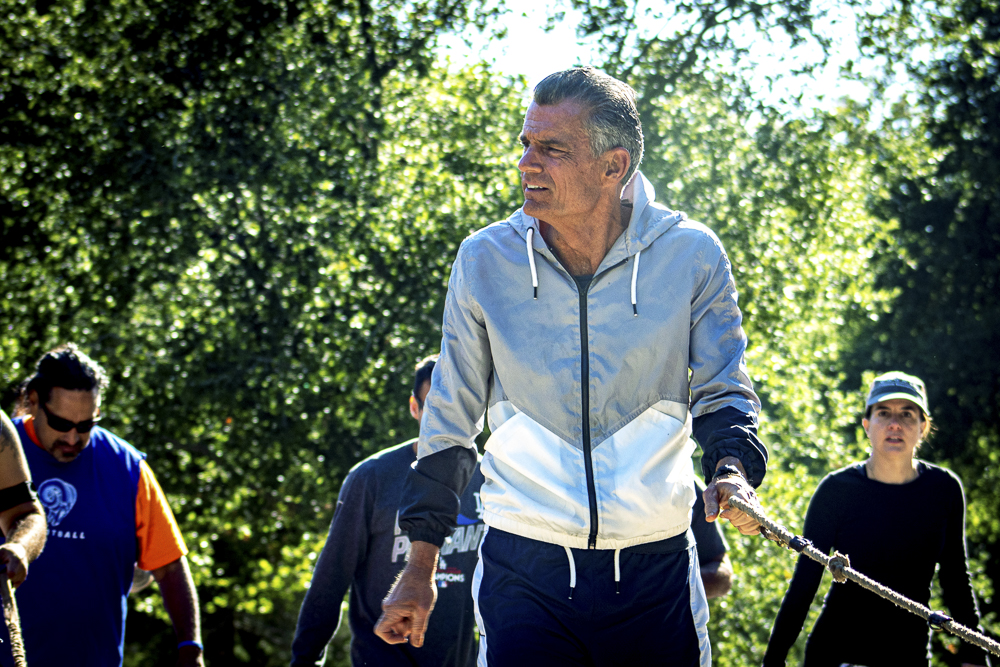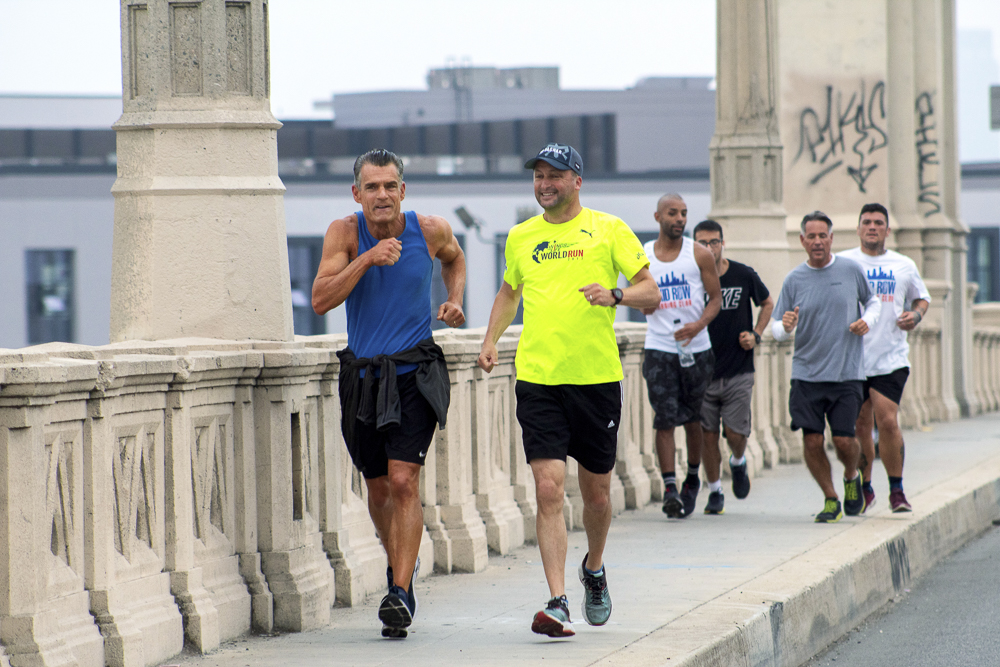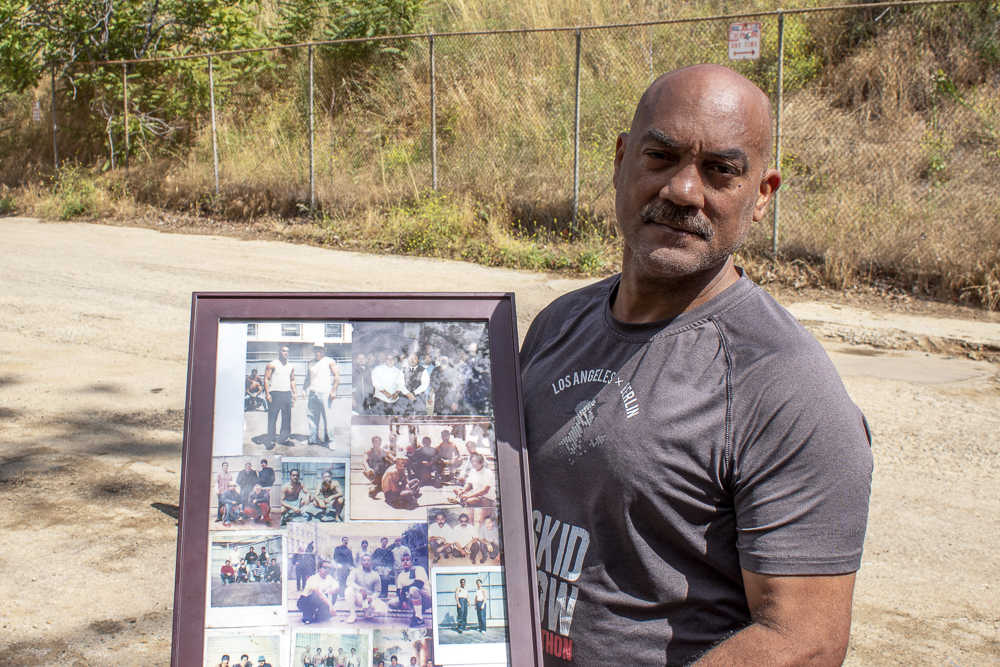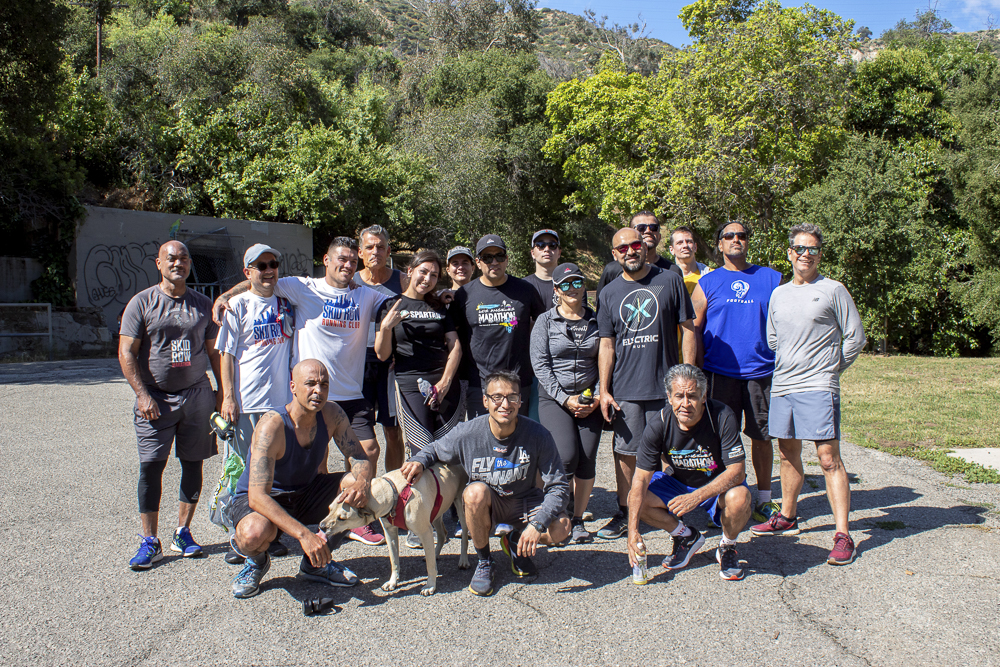The formerly incarcerated, and addicts, are reclaiming their lives with morning runs led by L.A. Superior Court Judge Craig Mitchell.
As the sun peeks through the skyscrapers of downtown Los Angeles, Craig Mitchell leads a group of 30 to 40 runners on a five-mile course through the streets of the city’s infamous Skid Row district. They do this twice a week. Bright neon shirts and the rhythmic patter of running shoes bring an unexpected liveliness along the corridor of the tent cities forming the capital of L.A.’s homeless population.
The pack, which is mainly composed of recovering addicts and formerly incarcerated members from the nearby Midnight Mission, has an unlikely shepherd in 62-year-old Mitchell. After concluding their morning run, Mitchell swaps his athletic attire for a black judges robe to finish out his day presiding over criminal cases at the Los Angeles Superior Court.
Mitchell is the heart of the Skid Row Running Club, a program he developed in 2012 after a defendant he sent to prison invited him to visit one of his sobriety classes at the Midnight Mission upon his release. Mitchell accepted the invite and was compelled to start a program that would recast his passion for running into a transformative experience for those looking to escape homelessness and the destructive patterns of addiction.
“It’s encouraging when you realize there is a connection to be made with another person. And with this running club, I feel like you have different facets of the community coming together.”
Craig Mitchell, founder of the Skid Row Running Club
Known to his fellow runners simply as “The Judge,” Mitchell has overseen nearly 500 people who’ve joined the club on their morning runs over the last seven years. Members include runners from various backgrounds and athletic ability. Some participants are homeless or recovering addicts, others are LAPD officers, public defenders and young professionals from the community. Recently, a couple from Switzerland traveled to Skid Row to take part in the group’s morning routine. No matter their background, the runners share the same goal — to support fellow club members in overcoming alcohol and drug abuse to achieve positive life goals.
“It’s encouraging when you realize there is a connection to be made with another person,” Mitchell says. “And with this running club, I feel like you have different facets of the community coming together.”
Judge Craig Mitchell and Rafael Cabrera talk with members of the Skid Row Running Club after a training run in Griffith Park. Mitchell and Cabrera became friends after meeting at a parole hearing in 2004. Photo by Alexis Garcia.
Mitchell speaks with quiet judicial deference. His tan sinewy frame radiates a confidence that commonly elicits respect from all that encounter him. It may seem incongruous that a man who spends part of his day sentencing others to prison would want to help ex-felons and addicts reclaim their lives, but for Mitchell — who has developed a reputation in the local law community as a principled judge — justice and compassion go hand in hand.
“This one-dimensional view of people is something I never subscribed to,” Mitchell says. “I was always able to see the other side of the person and that certainly hasn’t left me since I’ve been on the bench.”
Mitchell’s Catholic upbringing informs his empathy. As a young man, he wanted to enter the priesthood but found a higher calling in helping inner-city youth. For a time, he was even homeless himself, living out of a Volkswagen van as he worked his way through college at UCLA, before going to work in South Los Angeles where he taught high school for 17 years. He saw up close how gang violence and criminal activity affected his students and eventually enrolled in night classes at Southwestern Law School to earn his law degree. Mitchell became a prosecutor in the Los Angeles District Attorney’s office in 1994 and was elected to the bench in 2005.
Left: Craig Mitchell, who founded the Skid Row Running Club in 2012, leads a warm-up exercise for a training run in Griffith Park. Right: Mitchell runs with members of the Skid Row Running Club in downtown Los Angeles. Photos by Alexis Garcia.
“He’s the best guy,” says Rafael Cabrera, who has run with the judge since the club started in 2012. “I always tell people that if we had fathers like this we wouldn’t have prisons.”
Cabrera stands beside his black Honda Civic with custom license plates that read “XLIFER,” a sobering reminder of his former life as a convicted murderer at the age of 18. He met Mitchell, who was representing the state as a prosecutor, during a 2004 parole hearing. Cabrera was surprised when Mitchell cited his transformation in prison and recommended parole. Though Cabrera was denied parole on that occasion, he wrote Mitchell a letter to express gratitude for his support which initiated a years-long friendship.
“I never expected to get a letter from him,” Cabrera remembers. “We started writing for seven years and we became really good friends. We talked about politics, we talked about religion, we talked about the news. It was awesome.”
When Cabrera was released in 2010 after serving 28 years in prison, Mitchell was one of the first people he went to visit. Cabrera now works for the City of Los Angeles and is one of the key members of the Skid Row Running Club. He also provides mentorship and assistance to troubled and disadvantaged youth.
Rafael Cabrera, who was convicted of murder at the age of 18, holds a picture frame filled with photos from his time in prison. Cabrera has since transformed his life and mentors troubled and disadvantaged youth. Photo by Alexis Garcia.
Cabrera is not the running club’s lone success story. Ben Shirley, a professional musician who played bass for the rock band U.P.O. in the late ’90s to early 2000s, developed a drug and alcohol addiction which landed him on Skid Row in 2011. Shirley was one of the original running club members and spent two years at the Midnight Mission before recommitting himself to his art. He eventually earned a scholarship to the San Franciso Conservatory of Music and now works as a film and television composer. Another member of the running club recently worked his way out of the Midnight Mission to gain steady employment as a city bus driver; while another man who came to the club went on to enlist in the military.
There’s strong scientific evidence which suggests that aerobic exercise, like running, can have a positive effect on rebalancing — and in some cases even repair — parts of the brain that have been damaged by drug and alcohol abuse. Runner’s World took an extensive look at the academic research in a 2017 issue, noting multiple studies which show promise for running as an effective tool for recovery. In one such study, researchers in London found that 10 minutes of moderate exercise could reduce cravings among recently detoxed alcoholics. Another study from the University of Colorado at Boulder showed a possible reversal of cognitive brain damage in recovering alcoholics who participated in aerobic exercise.
“So many will say at the end of their first marathon that it’s the hardest thing they’ve ever done in their life,” says Mitchell, who completed his 77th marathon this spring. “But they’ve done it and they’ve succeeded. That’s really important.”
Members of the Skid Row Running Club pose for a group photo following a training run in Griffith Park. Photo by Alexis Garcia.
Each year, Mitchell rewards his most dedicated runners with a trip to participate in an international marathon with almost all expenses covered by the club. In 2013, the club took its first trip abroad to Ghana and has since traveled to Vietnam, Rome and Jerusalem. This fall they will compete in the Guayaquil Marathon in Ecuador. The trips are funded with the help of private donors, but Mitchell usually contributes a large chunk of the proceeds out of his own pocket. He says his investment is worth every penny.
“It helps develop gratitude which is so important,” Mitchell says. “When you have a community of caring people in your life, I think it is one of the critical components of successful recovery.”
Several members of the group, including Mitchell, were featured in the 2017 documentary “Skid Row Marathon,” which received critical acclaim and multiple awards on the film festival circuit. Mitchell says he has even received phone calls from towns that have hosted screenings of the documentary who want to emulate the example of the Skid Row Running Club in their own communities.
“It can be something as simple as running with another person,” Mitchell says. “If running isn’t your thing, maybe it’s taking a foster kid on a weekend or going to a convalescent facility two times a week and sitting down and having a meaningful relationship. If people would be willing to give their time, our communities would be so much better off.”

